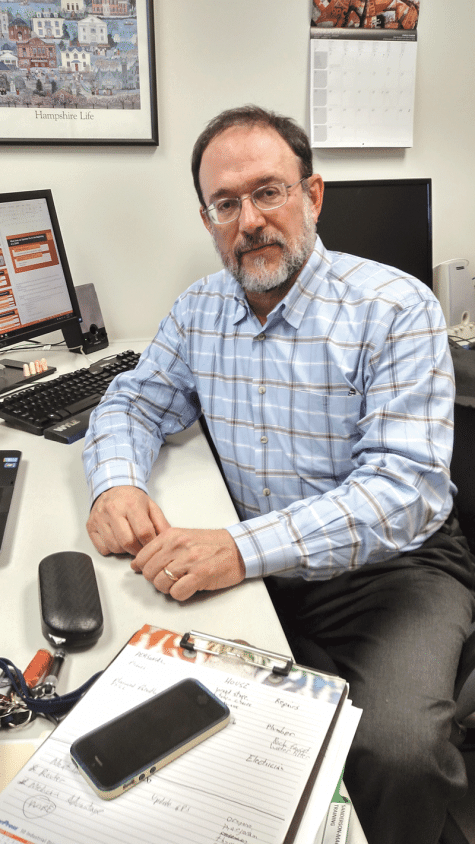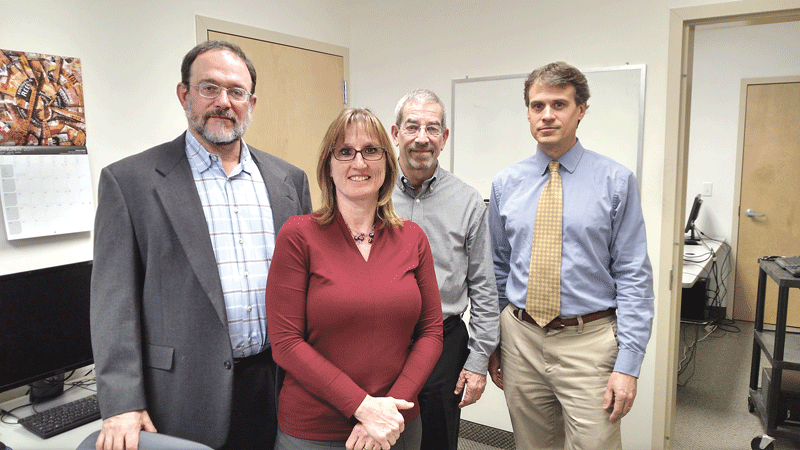Pioneer Training Makes Clients’ Lives Easier
Data Delivery

Pioneer Training President Don Lesser
Don Lesser wasn’t planning on a career in computers, but the field found him through a series of opportunities that arose during the 1980s. Those became the basis for Pioneer Training, which, for more than a quarter-century, has helped companies in myriad fields navigate the ever-changing world of technology and make their operations more efficient.
The computer field was an accidental career for many people back in the 1980s, Don Lesser says, because it was so new. He counts himself as one of those who stumbled into it, and he’s grateful he did.
In 1977, Lesser earned a master of fine arts degree in fiction writing. While in the MFA course, he learned word processing, which was a boon to novel writers, who would previously edit their work and then spend two weeks retyping it. An interest in computing soon followed.
In the 1980s, he started doing corporate training and technical writing as part of the Pioneer Valley PC User Group, which he chaired for several years. As part of the group, he started teaching classes on how to use DOS word processors and other equipment. That led him to Valley Data, then a large tech company in the region, which asked him to teach computer classes.
That led to even broader opportunities, which he recognized, creating the company known today as Pioneer Training.
“Other companies weren’t happy about sending people to Valley Data for training, so we broke off and became a separate company,” Lesser said. “Everyone needed training back in those days; it was new to everyone. People didn’t even know not to press ‘enter’ at the end of every line.”
“Throughout the ’80s,” he went on, “I was using word processing, but I also got interested in programming. I asked the fateful question, ‘how does this all work?’ The answer was ‘zeroes and ones.’ But I needed to know more than that.”
In 1990, Lesser forged a partnership with two others and started offering computer classes in the Hampshire Mall in Hadley. In 1995, with a need to expand, the business moved to a suite of offices on Bobala Road in Holyoke. During these years, the company grew to seven employees and 20 consultants, and the outfit was conducting 12 to 16 classes a week.
“Once you do training for somebody, they tend to trust you,” he said, and companies began approaching Pioneer for other services, including database programming and automation. In fact, those areas of the business began to grow until, around 2003, they were outpacing the training aspect of the company. “By 2006, training had really fallen off, and programming had taken off. So we followed the market.”
The company no longer needed the large classroom space in Holyoke, so in 2008, Lesser and a smaller, core group of team members moved to their current, smaller space in Northampton, where they still conduct classes in Microsoft Access, Excel, Google Apps, PowerPoint, Windows 10, Word, and other software — but focus mainly on other services to clients.
List of Computer Network/IT Services in Western Mass.
These days, training is 30% of the business, and the rest is programming, he explained. “To be honest, most public classes don’t run frequently. But we do private classes; for example, a law firm will call us and say, ‘we need some training,’ and either we’ll go down there and set up computers in their conference room, or they’ll send people here.”
Today, Lesser, as company president works with three others — Mannie White, director of training; Graham Ridley, consultant and director of programming; and Deb Napier, consultant and programmer — to meet the ever-changing computer needs of a loyal client base. Although training is still in the name, the company does much more than that.
Breaking It Down
Take programming, for instance. “A lot of programming consists of automating tasks for departments … turning a two-day process into a 20-minute process, most of which is watching the computer work,” Lesser told BusinessWest.
“We’re smaller now, so we don’t need a lot of companies to keep going,” he said. “New clients come in, we figure out what they need, provide it, and add them to the fold. Most of our new opportunities are smaller companies in this area. And a lot of small companies are quite behind what the MassMutuals are doing. We’re bringing them up to speed; that’s where our bread and butter is.”
Some need more help than others, he added — even if they don’t think so. “A couple of companies are still in Word Perfect, and they prefer not to leave Word Perfect, and we have to accommodate them.”
Many small and medium-size companies, he explained, start out by tracking company data on Excel spreadsheets. As they grow and their operations become more complex, working with a web of spreadsheets can become unwieldy and time-consuming. So Pioneer Training helps clients move to Microsoft Access, which is a more robust data-management tool that also saves employees time.
Other services Pioneer provides might include designing a database from scratch that meets a company’s current needs; automating complicated tasks so they can be performed by non-technical users; creating custom forms for inputting data; creating standardized, yet flexible, custom reports for the most effective data display; updating an existing database to meet a company’s changing needs; creating processes for regular data imports and exports; and consolidating data for better data mining.
Clients include companies from a wide range of industries. Pioneer’s database projects, for example, include developing a process-router database for a national metals testing and finishing company, which tracks and organizes processing steps required for complex metal-plating work; and work for a local transport firm to consolidate several processes that manage its day-to-day operations into one Access database.
Meanwhile, examples of Pioneer’s office-automation clients include a regional bank in Western Mass., for which it automated the creation and printing of a certified letter form for bank letters; developed a set of macros to automate printing of letters from the bank to customers; and created a set of 42 separate charts to track loan categories. Meanwhile, for an international bioscience and lab reporting firm, Pioneer developed an automated process to extract data from lab reports, create charts based on the extracted data, and insert charts and data into a Word template for use in court proceedings. It also simplified the company’s billing by analyzing data and producing a number of reports summarizing data in various categories.

The team at Pioneer Training, from left: Don Lesser, Deb Napier, Mannie White, and Graham Ridley.
As for its training arm, Pioneer maintains many repeat clients in a number of fields, from colleges to law firms to nonprofits. As one example, Western New England University wanted to offer staff the opportunity to upgrade their Word, Excel, and Outlook skills beyond the basics, so Lesser and his team designed a training program to meet the university’s goals, running a well-attended series of classes in all three applications.
On a national scale, Pioneer also developed online training courses for Pearson Education and reviewed the manuals for Microsoft Office 2000 and 2003, which involved testing every step in the book and flagging errors. “I feel like I’m one of four people in America who has written a formula for every function built into Excel,” Lesser said.
Lesser feels there’s more opportunity out there — “people still need training,” he said, “but fewer companies want to pay for it” — but the volume of work coming in keeps the four team members plenty busy, and he’s happy with the size of the business and the level of trust he has in White, Ridley, and Napier.
“We’ll tell you what works best for your company,” he said. “If people don’t feel like you’re holding them hostage, they’ll call when they need you, and they’ll be happy.”
Looking Back
Lately, Lesser has been producing training materials for Sanderson MacLeod, a brush manufacturer in Palmer.
“I started out doing corporate training, and now it’s coming full circle,” he told BusinessWest. “It’s technical, teaching someone how to use the machines to create the brushes. It’s not computers, not Microsoft Office-based, but they still need the training. I like to think of what I do as a spectrum, with pure training on one end and pure consulting on the other end, and I’m really happy to be anywhere along that line.”
Of the 50 people in that MFA program he took back in 1977, he said, maybe 20 are still writing fiction. Most of the others, like Lesser, wound up in far different fields, although he has continued to write, including a stint as a food columnist for the Daily Hampshire Gazette.
“That was the beauty of the computer industry in the ’80s. You didn’t set out to be a computer person,” he said. “I think a lot of artists — musicians, writers — fell into it. There was a lot of overlap. I’ve noticed that programming is a lot like writing. The output is different, but it comes from the same place inside me. I’ll see a problem and envision the solution fully developed. The work is getting the pieces down to make sure they work.”
When they do, that’s his personal reward.
“I think of it as moral work, in that we’re doing good for people, and we’re making their lives easier and better. I don’t want to put down any other occupation, but it’s not a matter of figuring out how to get money from someone who doesn’t want to give it to you; it’s a matter of figuring out how to solve somebody’s problem. It’s satisfying.”
Joseph Bednar can be reached at [email protected]






